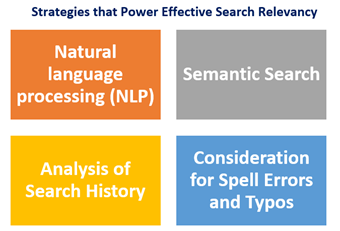Search Relevancy is Key to Enterprise Search Success

When you think about the new age search engines, what you find really amazing is the level of accuracy that these platforms achieve. In other words, it’s the capability of the search engine to fetch the most relevant search results that makes them so effective. It is this feature that is known as relevancy. The term "search relevancy" refers to the assessment of how closely a search result is connected to the query. You can easily locate the correct information at the right time thanks to a high level of search relevancy. It describes the degree of similarity or connection between the database's information and the search string you've put in.
While it comes to web search platforms, you enter a term and have the option of selecting search filters when looking for information. The term "search relevancy" refers to the assessment of how closely a search result is connected to the query. Keywords are words or phrases typed into the search field on the search screen. These are important words that will aid in the discovery of the exact information you seek.

Because the keywords show in the result, a search result is "related" to your keywords. The more often your keywords appear in a search result, the more relevant that entry is thought to be. The database is made up of information tables, and the tables are made up of fields of data. Because the title is the most significant part of an article or any content, the system will automatically examine all records to see whether your keywords occur in the title when you search for them. If it does, the system will prioritise these results in the search results list.
Understanding Search Relevancy in Enterprise Search
In many ways, search engines have evolved into the most significant instruments for extracting the most relevant insights from vast volumes of unstructured and unoptimized enterprise data. Thankfully, you have the new age enterprise search platforms like 3RDi Search, that are redefining search relevancy. When it comes to enterprise search engines, the process of achieving the standards of relevancy is more complex because enterprise data is unstructured, as compared to the highly optimised data on the web. Relevancy in enterprise search can be determined by a variety of characteristics, including search phrases, popularity, location, search history, and browsing behaviour.
Furthermore, various people will communicate their needs in different ways, and even for the same search term, different users may expect different outcomes. These nuances must be taken into account when creating a result ranking system. Because a user's question and meaning are not always obvious, search is inherently hazy, and language is frequently relative and contextual. To retrieve relevant information, a search engine must attempt to decipher the various words in a query.
To provide the level of search relevancy that people need, enterprise search platforms nowadays employ a variety of technologies. Enterprise search platforms utilise a variety of strategies to help parse the meaning of a user search term, including the following:

- Natural language processing (NLP): Natural Language Processing (NLP) is a field of study that focuses on enabling computers to analyse, comprehend, and derive meaning from human language in order to execute a wide range of tasks. It helps the search relevancy platform to understand and process queries more effectively.
- Semantic Search: Semantic search is all about retrieving results that are semantically relevant to the user's query, and is essential for a search relevancy platform. To put it differently, semantics is more focused on the context of the query as opposed to the words and phrases which are the primary focus of the traditional keyword-based approach. A semantic search platform understands the user's purpose behind the query, and it is this principle that allows semantic search to produce significantly more relevant search results.
- Analysis of Search History: This refers to the close tracking of the past search behaviour of every user to understand the contexts they seek and then presenting the most contextual search results to every user to meet their requirements. It’s all about creating a customized query that the user will find to be the most relevant.
- Consideration for Spell Errors and Typos: Another issue to deal with is typos. Spell checking is necessary to avoid poor search results and to improve relevance. More than 15% of searches in a search box are misspelt. Users still have to face this problem with most search engines, and it's a big impediment to achieving optimal search relevancy.
Maximizing search relevancy is critical, as users will be more satisfied and engaged if they are provided results that are relevant to their query and interests, resulting in a significantly more efficient search process.
Wondering how you can find the most relevant enterprise information in the shortest time? You need a powerful search relevancy platform like 3RDi Search with the next level of search relevancy. Visit www.3rdisearch.com or drop us an email at info@3rdisearch.com and our team will get in touch with you to help you get started on your journey of adding more value and meaning to the experience of the user with every interaction with the search engine.
